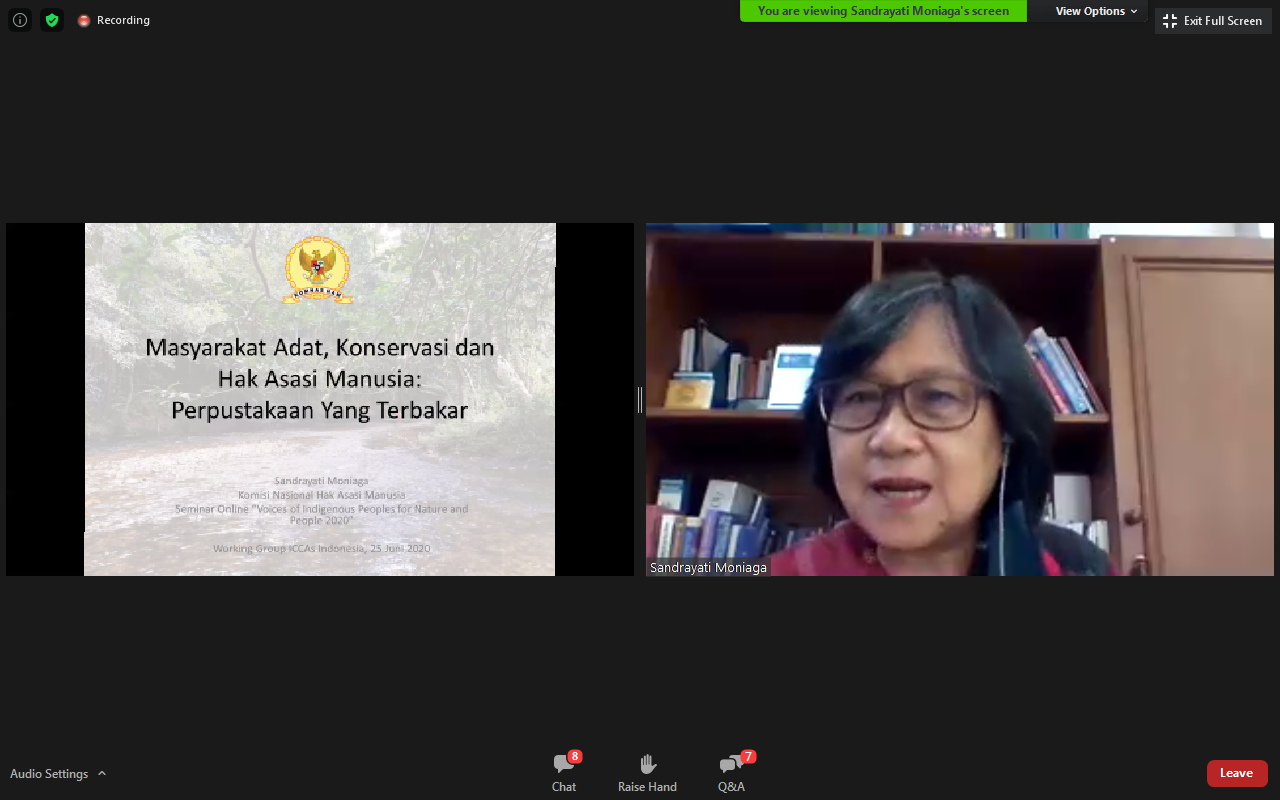Jakarta – ”Keberadaan masyarakat hukum adat dan hak-haknya atas wilayah adat serta sumber daya hutan perlu perlindungan negara,” said Sandrayati Moniaga as Commissioner of assessment and Research in a virtual web Seminar (Webinar) conducted by the organization Working Group ICCAS Indonesia (WGII), Thursday (25/06/2020).
In Article 18 B paragraph 2 of the 1945 Constitution, it is stated that the state recognizes and respects the unity of each Indigenous people and their customary rights. Furthermore, the bond (control) of indigenous peoples with their land and natural resources as one of the pillars of indigenous peoples ' identity is further strengthened in Article 6 (2) of Law No. 39 of 1999 on Human Rights, which states; " the identity of indigenous peoples, including the rights to ulayat land (rights to indigenous territories) are protected, in line with the Times”
The discussion was also attended by Director General of Conservation and Natural Resources and ecosystems (KSDAE) Ministry of Environment and Forestry, Wiratno, Director General of Social Forestry and Environmental Partnership (PSKL), Bambang Supriyatno, Executive Director of HuMa, Dahniar Andriani, National Executive Director of Wahana Lingkungan Hidup Indonesia (WALHI), Yaya Nurhayati and five Indigenous communities who represent Indigenous voices from various regions in Indonesia. This Webinar has the theme”Indigenous peoples 'voices for nature and people".

According to Sandra, Indigenous Peoples is a library, because in it there is information that forms the identity and protection of Indigenous Peoples, this needs to be legalized in local regulations (Perda) and the draft law on Indigenous Peoples. This is done so that the library containing valuable information is not lost by fire and there is legal certainty about the protection of the rights of Indigenous Peoples.
Agreeing with Sandra, Dahniar explained, in Article 67 of the Forestry Law (UUK) No.41 of 1999, paragraph one States, as long as in reality indigenous peoples still exist and their existence is recognized, they have the right to collect forest products to meet their daily needs, and manage forests based on applicable customary law and not contrary to the law. The determination of Indigenous Peoples is strengthened by local regulations.
Bambang said the Ministry of Environment and Forestry (KLHK) has been trying every year to communicate with local governments to establish local regulations (Perda) related to Indigenous Peoples. Another effort made by the MoEF is to establish customary forests, where as of May 2020, the MoEF has established 66 (sixty enem) customary forest units with an overall area of approximately 44,630 hectares, thus providing benefits for approximately 36,519 family heads (KK).
Furthermore, the MoEF will cooperate with the Ministry of home affairs of the Republic of Indonesia (Kemendagri) to accelerate the determination of Customary Law Community regulations in Indonesian territory.
Wiratno revealed, from indigenous people we get learning about respecting and preserving nature, so as not to cause damage that triggers natural disasters, Zoonoses (diseases transmitted by animals) such as Covid-19 cases which are suspected to come from animals, and the use of natural resources directly.
Indigenous peoples or Indigenous Peoples conservation areas (KKMA) is the wealth of the nation but not inanimate objects because there are humans in it. The state needs to protect, respect, and fulfill the rights of the people who have managed it. Indigenous peoples have contributed to the preservation of information from generation to generation so that a civilization is built. “Therefore, let's together take strategic and immediate steps to protect the KKMA,” retorted Sandra. (Feri/LY/RPS)
source : https://www.komnasham.go.id/index.php/news/2020/6/25/1455/masyarakat-hukum-adat-konservasi-dan-hak-asasi-manusia.html
